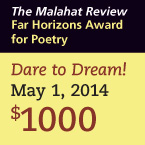Far Horizons Poetry Award deadline: 3 weeks away!
 Deadline: May 1, 2014 (postmarked) Deadline: May 1, 2014 (postmarked)
Prize: $1000 CAD to one winner
Entry fee:
$25 CAD for Canadian entries
$30 USD for entries from the USA
$35 USD for entries from elsewhere
Additional entries are $15 CAD (from anywhere).
Emerging poets who have yet to publish their poetry in book form are encouraged to enter The Malahat Review's biennial Far Horizons Poetry Award contest. Each poem should be no longer than 60 lines, including stanza breaks. Entry fee (our cheapest contest all year!) includes a one-year subscription or renewal to the Malahat.
Did you know you can submit for this contest online?
Read full contest guidelines on the Malahat website.
Far Horizons Interview: Catching Up with 2012's Winner, Kayla Czaga
 Malahat volunteer and recent contributor Vincent Colistro catches up with Kayla Czaga, winner of the 2012 Far Horizons Award for Poetry. Malahat volunteer and recent contributor Vincent Colistro catches up with Kayla Czaga, winner of the 2012 Far Horizons Award for Poetry.
VC: Your spectacular poem, "gertrude stein loves a girl," won the 2012 Far Horizons Poetry Award. Its childlike gusto, dread, and the way it hopscotches along, it's one of those poems for me that I enjoyed the first as well as the fourth time I read it! Is childhood, and specifically childhood gender, still a topic you explore in your poetry? What about it makes it fascinating poetic fodder?
KZ: I’ve written more on the subject, yes. Childhood is when we get overwhelmingly indoctrinated into our identities, taught how to act, how to become part of the consuming machine, how to define ourselves in opposition to what we’re not: a horse, a boy, that kind of girl, one who was born in a barn, etc. It’s also when the language-acquisition skills are the freshest, which creates some serious free play. I live with a two-year old (not mine, and not stolen) who is always saying things like, “you can be naked if you want!” And he calls lanterns “candle balloons.” Have you read that article about how kids are better poets than us because they haven’t yet learned how to cliché? It’s pretty interesting, and true.
Read the rest of Kayla's interview on the Malahat website.
2014 Translation Contest: Interview with Donald Winkler

Malahat volunteer Benjamin Willems recently spoke with Donald Winkler on the process of translation. Donald will be judging poem contest entries for Les poésies francophones du Canada: A Translation Prize (deadline May 15).
BW: Are there translation styles or methods that you’re particularly interested in?
DW: I find it difficult to talk about styles and methods of translation. The style, obviously, must correspond as far as possible to the style of the original. In this respect, a translator is like a character actor who assumes different identities. But that’s the fun of it. It’s a bit like playing dress up. As for method—I never “studied” translation, so nobody tried to inculcate in me a “method.” (Perhaps nobody does.) There are, of course, different practices. Some people may labour over a first draft, while others may prefer initially to just rough something out, and begin refining it afterwards.
Read the rest of Donald's interview on the Malahat website.
Issue #186 Sneak Peek: An Interview with Michael Prior

Malahat editorial assistant Karyn Wisselink spoke with Michael Prior on his contribution of three poems to Issue #186, Spring 2014. Michael was a finalist for the Malahat's 2013 Long Poem Prize and the 2014 Open Season Award for Poetry.
KW: “The Patagonian Hare” is charged with references to the Second World War. Can you introduce Benjamin Murmelstein to us?
MP: Murmelstein is a controversial figure, to say the least. He features prominently in Claude Lanzmann’s film The Last of the Unjust. He was an Austrian rabbi and scholar during the Second World War, and became one of the community leaders in the Theresienstadt ghetto. He and other elders negotiated with the Nazis in what they explain was an attempt to prevent as much suffering as possible. Murmelstein has been described both as a leader doing his best in a hopeless situation, and as a Nazi collaborator. The poem’s title comes from Lanzmann’s autobiography, which recounts his own involvement in the French Resistance and his work documenting the Holocaust.
Get a sneak peek at Issue #186! Read "The Patagonian Hare."
Read the rest of Michael's interview on the Malahat website.
Founders' Award Interview
Bruce Rice: 2014 P. K. Page Founders' Award Winner for Poetry
 Malahat poetry intern Samantha Ainsworth talks with Bruce Rice, winner of the 2014 P. K. Page Founders' Award for Poetry. Anne Simpson chose Rice's poem "Into the Wind" as the best poem to have appeared in The Malahat Review in 2013. Malahat poetry intern Samantha Ainsworth talks with Bruce Rice, winner of the 2014 P. K. Page Founders' Award for Poetry. Anne Simpson chose Rice's poem "Into the Wind" as the best poem to have appeared in The Malahat Review in 2013.
SA: “Into the Wind” reads sideways along each page; its gentle lines trail out like long hair or loose clothing worn by a person marching headlong into a strong wind. Can you elaborate on this choice of poem shape, and use of white space on the page?
BR: Well, we do like leaning into the wind here. The length of the line is really about the breath, the extended rhythms that fit the distances and the contemplative voice of the poem, which is an elegy. But I also like the idea of the generosity of the long line, as opposed to shortline poems which can muster a lot of intensity, but they can also be reductive when the subject asks for more. I am a big fan of vernacular, and Dennis Cooley has written about the generosity of this kind of voice and speech.
Discover Bruce's award-winning poem, "Into the Wind."
Read the rest of Bruce's interview on the Malahat website.
|